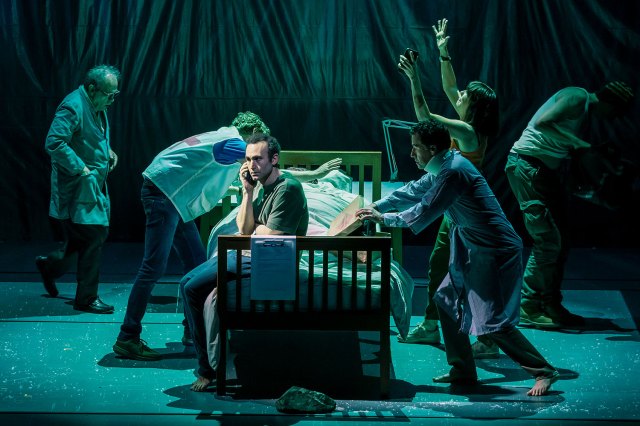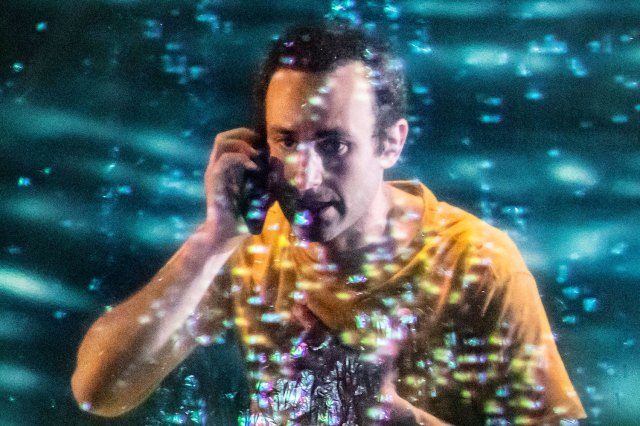Mnemonic at the National Theatre review – the iceman stunneth
Complicité’s hit play returns for a new run, 25 years after it first premiered

As signposted in an extended initial monologue delivered to the audience by actor Khalid Abdalla, Mnemonic is a play about memory. The fallibility of memory. The creative wonder of memory. Indeed, as a critic now examining his memories of the show and reflecting on the (entirely subjective) experience, there is a satisfying continuation of a theme.
Here’s another twist to the conceit: theatre company Complicité’s much-lauded production is now celebrating its 25th anniversary, brought back by original collaborators responding to their own memories of the late 1990s. So this is a review by a critic, remembering a play about memory, which has been made by people remembering their original staging of said play a quarter of a century ago. Just so we’ve got that one straight.
While diving headfirst into a miasma of concepts and themes, director and co-conceiver Simon McBurney (who starred in the original show but now passes his performance baton to Abdalla) pulls off a customary feat of making every storyline feel vividly realised, even as the seven-strong company members leap between characters, countries and time periods. The narrative feels like a globe-trotting thriller. On the side of a mountain, an ancient figure is found preserved by the ice. Across Europe, a woman desperately searches for her father. In London, a man exits a theatre and waits for his lost love to call back.

The 110-minute play, presented without interval, has a vast, continental sweep that makes it an enthralling proposition for the audience. It’s aided no end by Michael Levine’s versatile set, Paul Anderson’s lighting and Christopher Shutt’s sound. There’s also subtle, but poised, video work from Roland Horvarth. We ping from noire-ish moments in rain-riddled black cabs to chaotic and overrun eastern European hospitals. A musty conference, full of pompous male academics, is interrupted by a haggard figure ascending a dimly lit slope. Time periods clash and contradict like half-remembered histories: the show taps into something primordial.
At the heart of the story is the iceman – the very real figure of Ötzi, discovered in the early 1990s but likely to have lived 5000 years ago. His presence has slowly rewritten decades of assumptions about humanity’s origins. According to the show, if you work forwards, every single person on the planet could be his descendent. Slowly, brought to life as a puppeteer broken chair, he is reborn anew.
There’s excellent work from the multi-roling ensemble – Richard Katz breaks the tense ticking of the thriller format with a number of comedic moments, while Eileen Walsh lends a frantic and honest urgency to the figure of Alice, unmoored and desperate to find traces of her family roots.
The show wears some of its age, and it’s easy to admit that Complicité has presented more provocative and exciting productions since 1999. That doesn’t mean this isn’t a treat for those not able to see it in the 20th or early 21st century.
Where Abdalla’s opening monologue and the remainder of the story intersect provides a pleasing, but never overwhelming, moment of symmetry. The line between fact and fiction melds – in the same way we build memories from the detritus that remains to us – our brain’s synapses tell their own tales to plug the forgotten gaps. The show never truly reaches a jaw-dropping climax, but maybe that’s the point: time never obeys a neat three-act structure – it simply continues on, and on – like members of an ensemble repeating the same motions again and again.


















